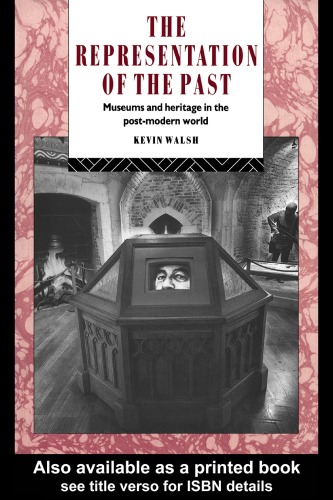

Most ebook files are in PDF format, so you can easily read them using various software such as Foxit Reader or directly on the Google Chrome browser.
Some ebook files are released by publishers in other formats such as .awz, .mobi, .epub, .fb2, etc. You may need to install specific software to read these formats on mobile/PC, such as Calibre.
Please read the tutorial at this link: https://ebookbell.com/faq
We offer FREE conversion to the popular formats you request; however, this may take some time. Therefore, right after payment, please email us, and we will try to provide the service as quickly as possible.
For some exceptional file formats or broken links (if any), please refrain from opening any disputes. Instead, email us first, and we will try to assist within a maximum of 6 hours.
EbookBell Team

4.1
40 reviews
ISBN 10: 0415079446
ISBN 13: 9780415079440
Author: Kevin Walsh
The 1980s and early 1990s have seen a marked increase in public interest in our historic environment. The museum and heritage industry has expanded as the past is exploited for commercial profit. In The Representation of the Past, Kevin Walsh examines this international trend and questions the packaging of history which serves only to distance people from their own heritage. A superficial, unquestioning portrayal of the past, he feels, separates us from an understanding of our cultural and political present. Here, Walsh suggests a number of ways in which the museum can fulfill its potential - by facilitating our comprehension of cultural identity.
1. The Idea of Modernity
Modernity: A Brief Definition
The Idea of Progress
Time In Modernity
The Idea of Progress and History
Early Archaeological Thought
The Development of Museums
The ‘Proto-Museum’
Industrialization
Local Self-Government
The Experience of Urbanization
The Modern Place
The First Museums Boom
The Modern Museum: A Critique
Museums: Time and Progress In Modernity
Conclusion
2. Post-Modern Societies I
Post-War Britain
The New Right
A Reaction to Welfarism
The Development of the Service Sector
The Flexible Work-Force
A Post-Modern Economy?
3. Post-Modern Societies II
Post-Modernity and the New Right
Post-Modern Politics (Post-Materialism)
De-Differentiation and the Homogenization of Culture
Time-Space Compression and the ‘End of History’
Conclusion
4. Conserving a Past
Early Preservationism
The Growth of Preservationism
The Threatened Nation
The Growth of Heritage Conservation
The Cult of the Country House
National Conservation Bodies
The End of Modernity, and Industrial Conservation
Post-Modern Architecture
Heritage Magazines
The Idea of Nation
Heritage and Europhobia
5. Simulating the Past
Early Forms of Heritage Representation
Proto-Heritage: Folk-Life Museums
Empathy and First-Person Interpretation
Discussion
Heritage Centres
The Spectacle In the Museum
Discussion
6. Heritage Reconsidered
Leisure Tourism
Heritage Leisure
Visitor Trends
Merriman and Cultural Capital
Service-Class Culture
Mass Culture, Hegemony, and the Commodification of Pasts
Hegemony and Ideology
The Imagineering of Space
The Heritagization of Space
The Albert Dock: Heritage Space Considered
7. A Sense of Place
A Future for the Past?
Cognitive Mapping
Timing Space
The Four-Dimensional Web
Places and Communities
8. The Museum As a Facilitator
The Concept of the Ecomuseum
Places and Environments
Interactive Video
The Traditional Museum
A Role for Exhibitions?
Consumers Into Producers
9. Conclusion: The Remoteness of the Past
Public Service
screening the past film and the representation of history
the virtual representation of the past
the representation
the representation amendment
kevin walsh the representation of the past
the representation and commemoration of the past
Tags: Kevin Walsh, Representation, Museums